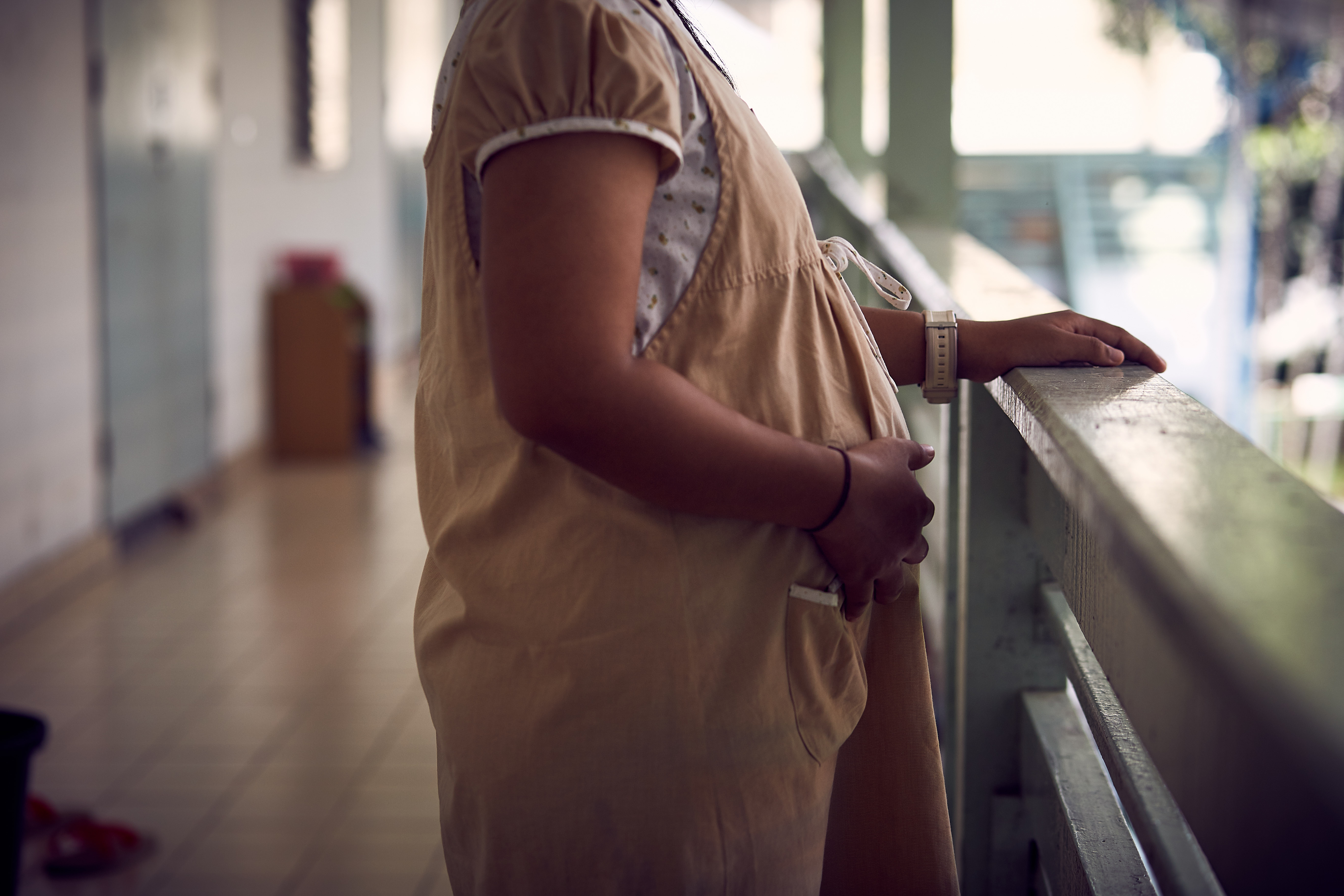Bangkok
“I had plans for my life, but since I got pregnant I had to plan for my life in a different way. If I knew this was going to happen, I would have just focused on my studies. I would not have bothered with that guy.”
Sitting cross-legged on a wide and tiled balcony, Fern’s eyes are downcast. Dressed in a loose-fitting maternity dress, her hair tied in a schoolgirl braid, the teenager gently touches her swollen belly while beside her, a small group of women and girls - some pregnant, others nursing newborns – chit-chat earnestly amid the intense midday heat.
“My mother came to visit and we both cried a lot,” whispers Fern. “But I am comfortable here now. I feel safe.”
In Bangkok’s sprawling outer suburbs, the Emergency Home offers a secure haven - providing crisis care and shelter for women and girls like Fern who find themselves unexpectedly pregnant, desperate and with nowhere else to go. Though Fern herself is 18, the youngest here is just 13, while the half dozen other teenage residents fall somewhere in between.
“One of the major problems we have in Thailand, like many other countries, is inequality which contributes to the challenge, says Wassana Im-Em, Assistant Representative for UNFPA, the United Nations Population Fund, in Thailand. “This means a lack of access to education – including comprehensive sexuality education - and employment for many young persons, this means inequality between the rich and the most vulnerable populations, all of which affect sexual and reproductive health. And we see can see this in the statistic of adolescents who become pregnant. From the data, we know that it is the two poorest quintiles, the poorest 40 per cent, which have the highest rate.”

Though Thailand is classified as an upper middle income country, with aspirations to reach fully developed status in the next 20 years, the statistics on teenage pregnancy remain high. About 1.6 million babies were born to teenage mothers over the last 15 years, with a 54 per cent increase from 2000 to 2014. In 2016 alone, some 14.2 per cent of all pregnancies nationwide were to adolescents, with live births in this category coming in at just under 95,000.
In this context, Fern’s story is not unusual, and represents well the complexities and the challenges.
Academically gifted and vice-president of her school’s student council prior to her pregnancy, Fern lives alone in a single-room apartment, while her mother is employed as a domestic worker elsewhere in the city and her father absent for some years. Admitting that at times she felt “lonely”, it was a friendship with a boy begun in an Internet chat-room that lead to Fern’s first sexual encounter, and then, to her shock, a pregnancy.
“We communicated for a few months and then he asked if he could come to my room. We talked for a while, and then he asked if we could have sex together. At first I refused but he kept insisting. Then, when I asked him to use a condom, he said, ‘No, it’s no fun to use,’” Fern recounts.
For the Emergency Home’s Director, Nattiya (Kat) Thongsrikate, stories of girls living alone or just with siblings from a young age, as well as gender inequality and a limited understanding of their own sexual and reproductive health, are all too common.
“The girls who come here are mostly from broken families. So that is the first disadvantage. But in my experience, they also lack crucial knowledge. Many think that the first time they have intercourse will not lead to pregnancy. And boys think this way too. So they don’t fully understand their own sexual and reproductive health. In addition, they do not have the skills to negotiate what boys ask them to do.”
Though sex education is compulsory in Thai schools, many, including the teenage mothers at the Emergency Home, do not feel it is adequate. Focusing more on basic biology and anatomy, many say they simply do not understand the risks or how to protect themselves.
“My school did have some sex education, says May, 15. “But in my opinion there was not enough detail. Talking about sex is not wrong and teachers need to understand they need to go deeper, so kids can manage their own sexual health and activity.”
May’s baby boy, Ton, is now one month old, but after being abandoned by the boy’s father and faced with her family’s limited ability to provide for “one more mouth to feed”, she is grappling with the choice of either giving Ton up for adoption, or returning home, taking a job at her local 7-Eleven convenience store and trying to manage as a single parent. Despite her love for Ton and an obvious bond, May quietly admits she is simply “not ready to take care of a child” and “cries every day”.

For Fern, a steely determination to complete her education and eventually attend university is admirable. Yet, for the foreseeable future, she’ll be limited to attending classes just one day a week, when her mother can come and assist with childcare.
“To achieve what I want there could be problems, some difficulties’. Fern says. “First of all I am worried how long I can hide the fact that I have a baby. (Because of the stigma) I do not want anyone to know. Also there is the financial situation of my mother, I am worried about how she can support me, my education and now the baby. And if my mother is not available, I would have to hire a babysitter just so I can do my lessons, which I cannot afford. It is a big burden.”
Recognising the gaps and inequalities that contribute to scenarios such as these, Thailand’s government has approved a new bill - The Prevention and Solution of Adolescent Pregnancy Problem Act - which aims to improve the quality of sexual and reproductive health education across the country, and ensure better communication and information-sharing across all key ministries.
The measure, which was formulated with support from multiple government and civil society stakeholders as well as UNFPA, was passed in 2016. Now the challenge will be in implementing it effectively.
“As we commit to supporting the Sustainable Development Goals to leave no-one behind, it is important we give opportunities to adolescent mothers, and for those adolescents who are not pregnant, the information, knowledge and the means to prevent early pregnancy,” says UNFPA’s Wassana Im-Em. “As a country, we cannot escape the middle-income trap without dealing with and solving this fundamental problem.”
* Names have been changed to protect privacy
This story was written to complement the launch of UNFPA’s annual flagship report, State of World Population, whose 2017 theme is “Worlds Apart: Reproductive health and rights in an age of inequality.” Access the report here: http://www.unfpa.org/SWOP


